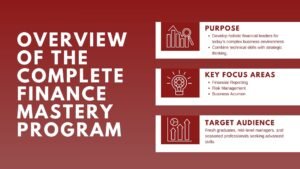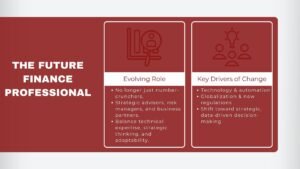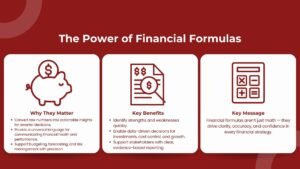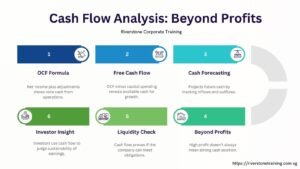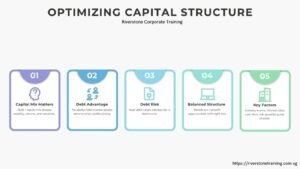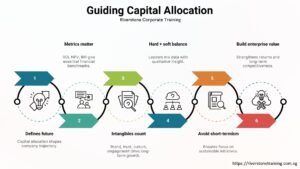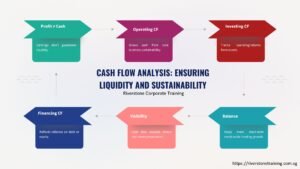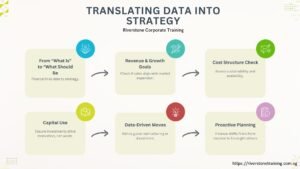Valuation Courses Learn to Value Companies and Assets Accurately
Valuation Courses: Learn to Value Companies and Assets Accurately
Valuation is at the core of all the major financial decisions, be it mergers and acquisitions, fundraising, investment analysis, and strategic planning. Making a proper assessment of the value of a company or asset is one of the most important skills in finance. For analysts, investors, and corporate managers alike, courses in valuation lay the technical and analytical grounding needed to make the right decisions to propel business growth. For analysts, investors, and corporate managers, enrolling in valuation courses provides the technical, analytical, and strategic foundation necessary to make well-informed decisions that drive sustainable business growth and shareholder value.
Today’s financial markets are highly dynamic and are introduced by fluctuations in value of these companies depending on performance, market sentiments, macroeconomic factors and so on. As such valuation is both a science and an art. It involves a mix of quantitative analysis, common sense and knowledge of economic dynamics. Through structured training, professionals can learn the methods of valuation and be able to apply them with confidence in real-life situations. This equips them to confidently assess opportunities, negotiate deals, and financial modeling techniques with strategic reasoning Singapore communicate valuation insights credibly to stakeholders. Ultimately, mastering valuation empowers finance professionals to transform complex financial data into meaningful business intelligence and make decisions that shape the future of organizations.

Core Principles of Valuation
At a basic level, valuation focuses on determining the objective value of a business, a security or an asset by means of analysis of its financial performance and the potential future cash flows. In professional valuation courses, there are various widely accepted approaches which are taught.
Discounted Cash Flow or DCF is one of the oldest methods, which focuses on future cash flows of a given company and discounting them to present value using an appropriate cost of capital. This strategy, often emphasized in valuation training Singapore, focuses on understanding the drivers of business and sustainability in the long run.
Next, the Comparable Company Analysis (CCA) method compares industry multiples in valuing similar firms. It helps in understanding the market valuation of companies having similar characteristics and is a good benchmark value. An alternative approach, the Precedent Transaction Analysis (PTA) approach, uses information from past M&A transactions to determine what similar companies have been priced at transactions in the past.
In addition to these, valuation courses also mark one’s exposure to asset-based valuation, sum-of-the-parts analysis, and option pricing models so that they can have an all-in-one toolkit to address both traditional and non-standard valuation appointments.
Why Accurate Valuation Matters
So, if you get this wrong, the consequence can prove disastrous to your finances. Overvaluation may lead to poor investments, overvalued acquisitions and shareholder losses, while undervaluation may result in lost opportunities or undervalued equity raises. For professionals in investment banking, private equity and corporate strategy, getting valuation right is non-debatable For professionals working in investment banking, private equity, venture capital, or corporate strategy, achieving accurate and defensible valuations is non-negotiable—it is the foundation upon which sound financial decisions are made.
Valuation skills are also important in negotiations and communicating to investors. When executives have a clear understanding of what makes the enterprise value they are able to tell strategic stories to attract funding and common market confidence. The ability to quantify and justify value creation helps leaders not only in securing deals but also in strengthening market credibility and trust.
In addition, not only small capitals people (in other words, starting eyes), this valuation knowledge is also crucial for fund managers to evaluate portfolios, for accountants to do impairment testing or fair value measurement under IFRS requirements, and even for firm specialists. Whether for start-ups raising their first round of capital or multinational firms executing cross-border transactions, learning business valuation and financial modeling online Singapore valuation expertise ensures transparency, accuracy, and strategic alignment across all financial decisions.
Conclusion to Valuation Courses Learn to Value Companies and Assets Accurately
Valuation courses give empowering professionals one of the most versatile and defining skills in finance. They impart the analytical discipline, market knowledge and judgement needed to value responsibly and accurately.
These programs train learners to combine financial modeling with strategic reasoning, ensuring that every valuation reflects not just figures, but also the underlying business reality and economic context. By learning about these techniques, learners can assess opportunities, reduce risks, and make informed decisions that will determine the financial future for businesses. Whether you are a potential analyst, investor, or entrepreneur, the basis of effective financial leadership is valuation training. The knowledge of methods such as Discounted Cash Flow (DCF), Comparable Company Analysis, and Precedent Transactions helps learners develop a structured, data-driven approach to evaluating assets and businesses. Whether you are an aspiring analyst, investor, entrepreneur, or corporate manager, valuation training forms the foundation of effective financial leadership. It provides the clarity and confidence needed to navigate complex financial environments, communicate value to stakeholders, and make decisions that drive long-term success and growth.





